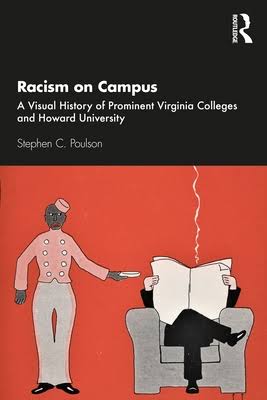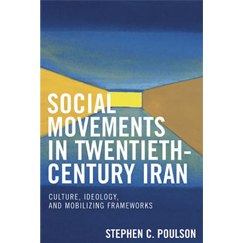Published in 2021 by Routledge Press.

Description
Drawing on content from yearbooks published by prominent colleges in Virginia, this book explores changes in race relations that have occurred at universities in the US since the late nineteenth century. It juxtaposes the content published in predominantly white university yearbooks to that published by Howard University, a historically black college. The study is a work of visual sociology, with photographs, line drawings and historical prints that provide a visual account of the institutional racism that existed at these colleges over time. It employs Bonilla-Silva’s concept of structural racism to shed light on how race ordered all aspects of social life on campuses from the period of post-Civil War Reconstruction to the present. It examines the lives of the Black men and women who worked at these schools and the racial attitudes of the White men and women who attended them. As such, Racism on Campus will appeal to scholars of sociology, history and anthropology with interests in race, racism and visual methods.
Reviews
We live in a world where some of our elected leaders used Black face in college. Why? Stephen C. Poulson’s Racism on Campus is a compelling, if sobering, answer to this question. Poulson’s historical analysis of yearbooks and other campus publications at Virginia universities shows that our colleges have long been the home of such unethical practices. Racism on Campus is excellent visual sociology and powerful social critique.’ – Fabio Rojas, Indiana University, USA
As the political debate around campus culture in the US grows, this book investigates the evolution of race relations in Virginia universities and Howard University. Relying on visual sociology and the conceptual framework of structural racism, Poulson examines university yearbooks to document the longevity of racism on campuses in Virginia. His argument for reparations is convincing and should be widely discussed inside and outside academia.’ – Gianluca De Fazio, James Madison University, USA
Published in April 2016 by Rutgers University Press. An exploration of Lifestyle Sport in the Twenty-First century.

Description
Triathlons, such as the famously arduous Ironman Triathlon, and “extreme” mountain biking—hair-raising events held over exceedingly dangerous terrain—are prime examples of the new “lifestyle sports” that have grown in recent years from oddball pursuits, practiced by a handful of characters, into multi-million-dollar industries. In Why Would Anyone Do That? sociologist Stephen C. Poulson offers a fascinating exploration of these new and physically demanding sports, shedding light on why some people find them so compelling.
Drawing on interviews with lifestyle sport competitors, on his own experience as a participant, on advertising for lifestyle sport equipment, and on editorial content of adventure sport magazines, Poulson addresses a wide range of issues. He notes that these sports are often described as “authentic” challenges which help keep athletes sane given the demands they confront in their day-to-day lives. But is it really beneficial to “work” so hard at “play?” Is the discipline required to do these sports really an expression of freedom, or do these sports actually impose extraordinary degrees of conformity upon these athletes? Why Would Anyone Do That? grapples with these questions, and more generally with whether lifestyle sport should always be considered “good” for people.
Poulson also looks at what happens when a sport becomes a commodity—even a sport that may have begun as a reaction against corporate and professional sport—arguing that commodification inevitably plays a role in determining who plays, and also how and why the sport is played. It can even help provide the meaning that athletes assign to their participation in the sport. Finally, the book explores the intersections of race, class, and gender with respect to participation in lifestyle and endurance sports, noting in particular that there is a near complete absence of people of color in most of these contests. In addition, Poulson examines how concepts of masculinity in triathlons have changed as women’s roles in this sport increase
Reviews
“Poulson explores interesting, timely, and relevant questions about the nature of, and reasons for, participation in the sports of mountain-bike racing and triathlon in this engaging, persuasive, and extensively researched book.”
–Belinda Wheaton, University of Waikato, New Zealand
“This inventive treatment of the sociology of sport will interest outdoor enthusiasts as well as scholars … Recommended. Upper-division undergraduates; graduate students; general readers.”
–Choice
“Poulson presents a comprehensive, thoughtful and well-researched critique of the emergence and transformation of lifestyle sports in the twenty-first century. His discussion of the rationales and motivations for engaging in such arduous physical activities is framed within the context of current theoretical discussions in the sociology of sport.”
–Contemporary Sociology
“Stephen Poulson has written a persuasive and extensively researched book about lifestyle sport using mountain biking and triathlon as his main examples.”
–International Sociology Reviews
Social Movements in Twentieth Century Iran

This study investigates cycles of social protest in Iran from 1890 to the present era. The social movements include: the 1890-1892 Tobacco Movement; the 1906-1909 Constitutional Revolution; two post-World War II movements, the Tudeh (Masses) and the National Front; the 1963 Qom Protest; the 1978-1979 Iranian Revolution and the Iranian Reform Movement. These movements confronted two primary questions: How should the Iranian state achieve independence in the world and what rights should individual Iranians enjoy in their political and social system? This is an examination of the framing of these questions and their answers by various Iranian political actors over time.
Rowman and Littlefield Publishing
Reviews
This book is a good review of the history of political protest, social movements, and political Islam in Iran, as well as a good overview of the literature on these subjects. Summing Up: Highly Recommended. All levels/libraries.
— A. Mahdi, Ohio Wesleyan University; CHOICE
Social Movements in Twentieth-Century Iran chronicles the development, use, and modification of various master frames during cycles of protest from 1890 to the present. It is an insightful analysis of major social movements during this period, and particularly of the relevance of culture and framing processes and their intersection. A useful book for those interested in Iranian collective action and the analytic utility of contemporary social movement theorizing and perspectives.
— David A. Snow, University of California, Irvine




You must be logged in to post a comment.